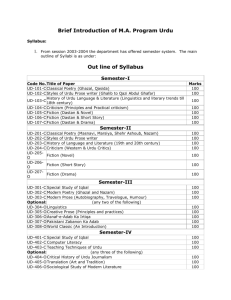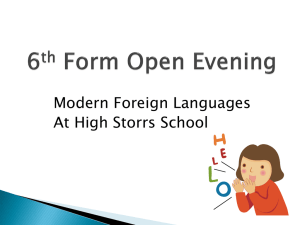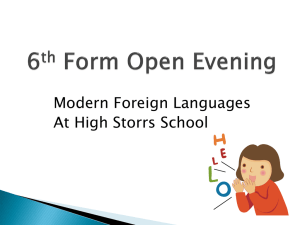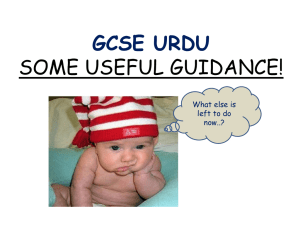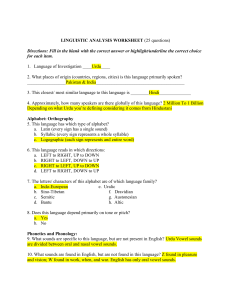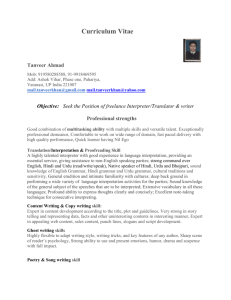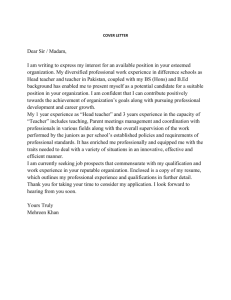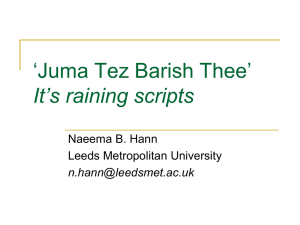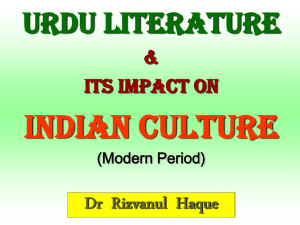Outline - University of Washington
advertisement
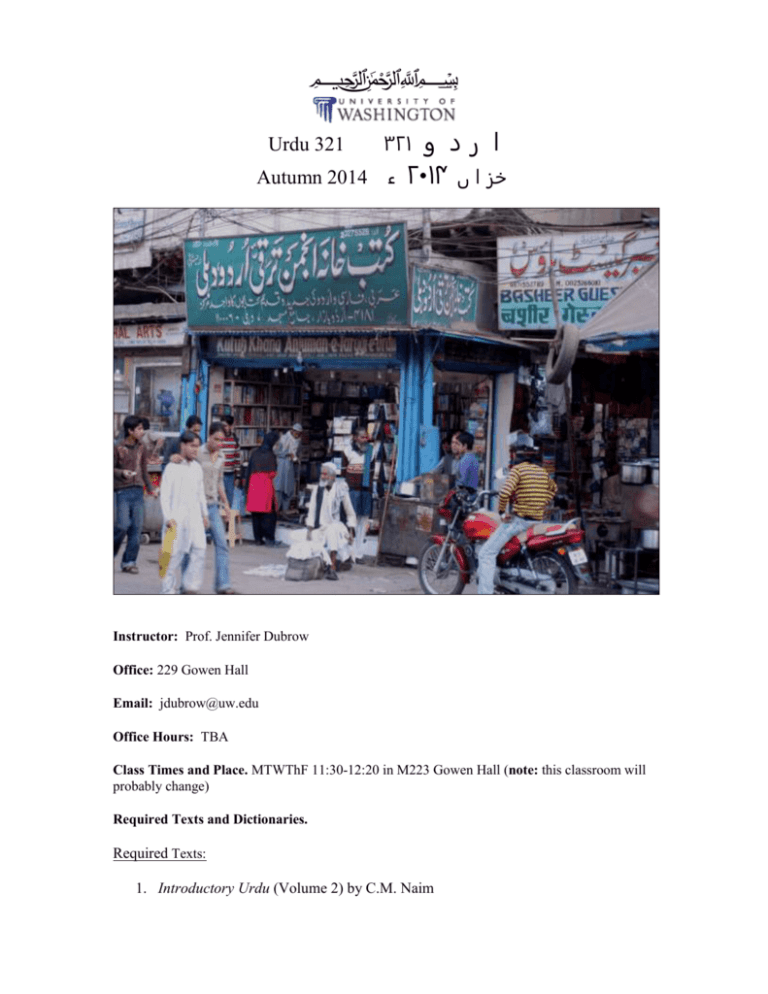
﷽ Urdu 321 Autumn 2014 ا رد و ۲۱۳۲ خز ا ں ۱۲۳ ء Instructor: Prof. Jennifer Dubrow Office: 229 Gowen Hall Email: jdubrow@uw.edu Office Hours: TBA Class Times and Place. MTWThF 11:30-12:20 in M223 Gowen Hall (note: this classroom will probably change) Required Texts and Dictionaries. Required Texts: 1. Introductory Urdu (Volume 2) by C.M. Naim 2. Urdu: An Essential Grammar by Ruth Laila Schmidt 3. Urdu: Readings in Literary Urdu Prose by Gopi Chand Narang. (Available at the University Book Store in textbook section of Asian Languages and Literature) Required Dictionaries: 4. English-Urdu/Urdu-English Combined Dictionary by Abdul Haq (available on Amazon) Suggested Dictionaries (check to see if they become available): 5. Urdu into English: Standard 21st Century Dictionary by Bashir Ahmad Qureshi. 6. English into Urdu: Standard 21st Century Dictionary by Bashir Ahmad Qureshi. Or 1. Advanced twentieth century dictionary : English into English into Urdu : more than 35,000 words and 25,000 idiomatic phrases explained in simple easy-tounderstand language / rev. and enl. by Abdul Haq 2. Anjuman's Urdu-English dictionary = Anjuman kī Urdu-Angrezī lug̲ẖat / martabah Abdul Haq Online Urdu dictionaries: http://www.urduword.com/ (for very common words) http://www.crulp.org/oud/default.aspx (Urdu Lughat )ار د و لغتfor later use. Overall Goals for Quarter and Year. The main objective for the Intermediate Urdu course sequence (Urdu 321-322-323) is the enabling of students to develop proficiency in Urdu in each of a number of distinct skills, namely, speaking, reading, writing, listing, and knowledge of systematic Urdu grammar. The course is designed in such a way as to enable students to develop their abilities with regard to each of these skills in a parallel manner. There will be sustained emphasis on the systematic development of vocabulary, study of Urdu grammar, especially complex sentence formations. At the end of the course students will be able to open, sustain and close more complex daily conversation in Urdu and will be able read and appreciate, to some extent Urdu literature. During the course the student will be introduced to some Urdu literary figures such as Ghalib, Iqbal, Faiz etc, and some major literary genres such as Ghazal, Nazm, Marsiyah, Qasidah etc. The primary text for the course is Introductory Urdu: C.M. Naim Vol.2, which has a total number of thirty units, most of which we will cover during the three quarters. During the Autumn quarter we will start from Unit Five. Each unit has a reading passage and five exercises: A, B, C, D and E. Some exercises will be done in class after reading the passage and some will be given for homework assignments. These units progress from simple to more advanced vocabulary and sentence constructions, and each unit exercise draws material from previous units. For the systematic grammar learning, Urdu: An Essential Grammar by Ruth Laila Schmidt will be used. Reading and listening material will also be drawn from other sources for reading Urdu literary books, Urdu newspaper, web materials, magazine, comics/cartoons etc and for listening film songs and scenes, T.V serial clips, ghazal singing, qawwali and news reading etc. Related material will be circulated in class. During the course students will also learn about South Asia society in general and the culture and etiquette of the Urdu speaking community in Pakistan, India and abroad. Grading: The final grade for Urdu 321 is based on the following factors: Written homework assignments (25%); Weekly dictations (10%); Two scheduled Class Tests and several pop quizzes (25%); Project Presentation (5%) Final examination (15%); Spoken Drills and Class Participation (20%). Your two lowest homework grades and the (one) lowest dictation score will be forgiven. There is no midterm examination. Policy on Late Homework Assignments, Missed Quizzes and Related Matters. Each written homework assignment, dictation and quiz will be graded on a ten-point scale. Missing or unexcused late homework will earn a grade of zero. Makeup examinations will be given only under exceptional circumstances, such as serious illness (with documented proof, as doctor’s note), or death in the family, etc. All homework assignments are to be turned in at the beginning of class on the day due. Classes will begin promptly at 11:30 and students are expected to be in class on time. Students should take note of the dates of dictations, quizzes and class tests (including the final examination). Requests for the rescheduling of examinations are not granted. NOTE CAREFULLY THE DATE OF THE FINAL EXAMINATION. IT IS NOT PERMITTED TO TAKE THE EXAMINATION EARLY. Make your travel plans for the holidays accordingly. Policy on Handwriting. Neatness counts. You are expected to write all of you Urdu in an acceptable handwriting. All homework is to be done in pencil, with no crossovers or cross outs (i.e., errors are to be erased and corrected). Homework written in unacceptably sloppy handwriting will be graded down. Students are advised to invest in a good eraser. As we proceed students will also be introduced to downloading and using different Urdu typing materials available for computers and may be asked to turn in some typed homework assignments. Attendance and Student Responsibility. Students enrolled in Urdu 321 are expected to attend all class sessions and are held responsible for material covered in those sessions. It for any reason you are unable to attend a class session, it is your responsibility to find out from another student what was covered in that session and whether any assignments or instructions were given out while you were absent Attendance will be taken in each class. Enrollment Restrictions: Because it is quite possible that students enrolled in Urdu 321 may already have some exposure to or proficiency in Urdu, it is important that the University of Washington policy concerning taking language courses at the first and second-year level be understood. This policy reads as follows: First-year (elementary) or second-year (intermediate) foreign-language credit is not granted either by examination or by course completion in a student’s native language. “Native language” is defined as the language or one of the languages, spoken in the student’s home during the first six years of his or her life and in which he or she received instruction through the seventh grade. Students who misrepresent the extent of their background so as to gain entrance to a course at the elementary of intermediate level may be dropped from the rolls of that course. Students who have questions as to whether they are prohibited from taking Urdu 321 according to this policy should speak with the instructors so as to obtain a suitable placement in an Urdu course at the appropriate level. ***
